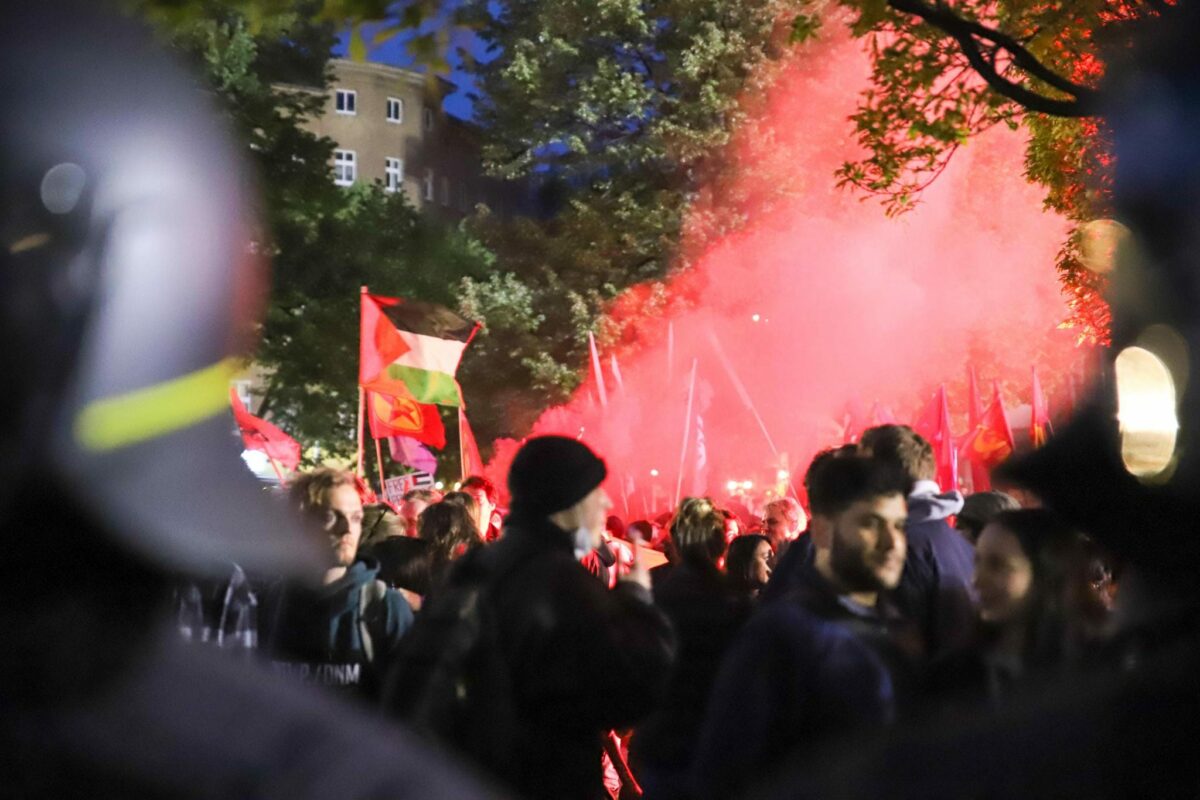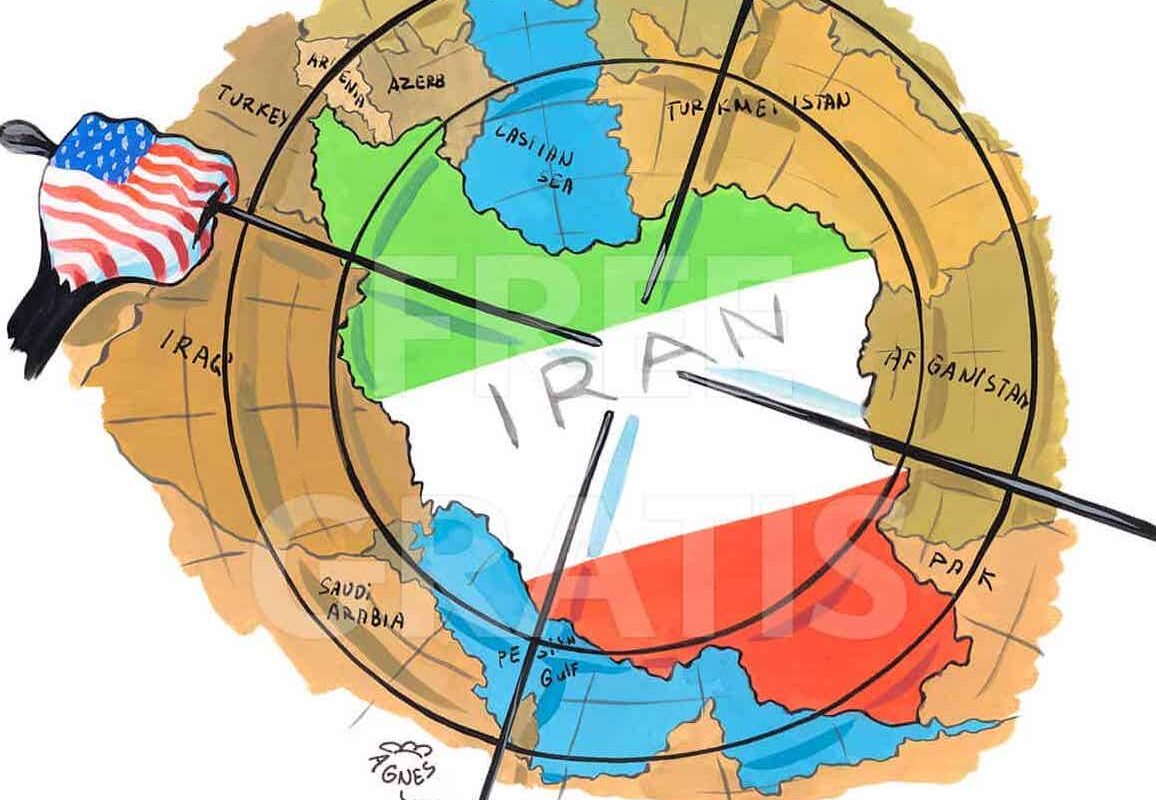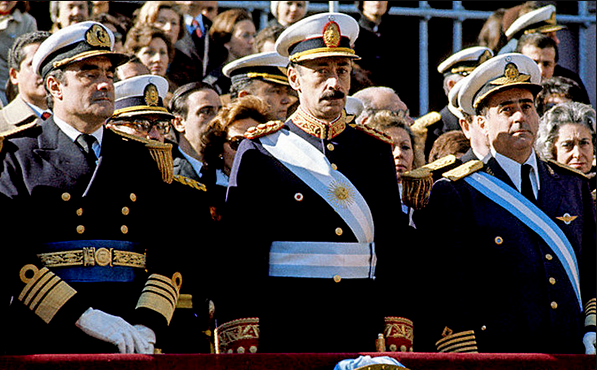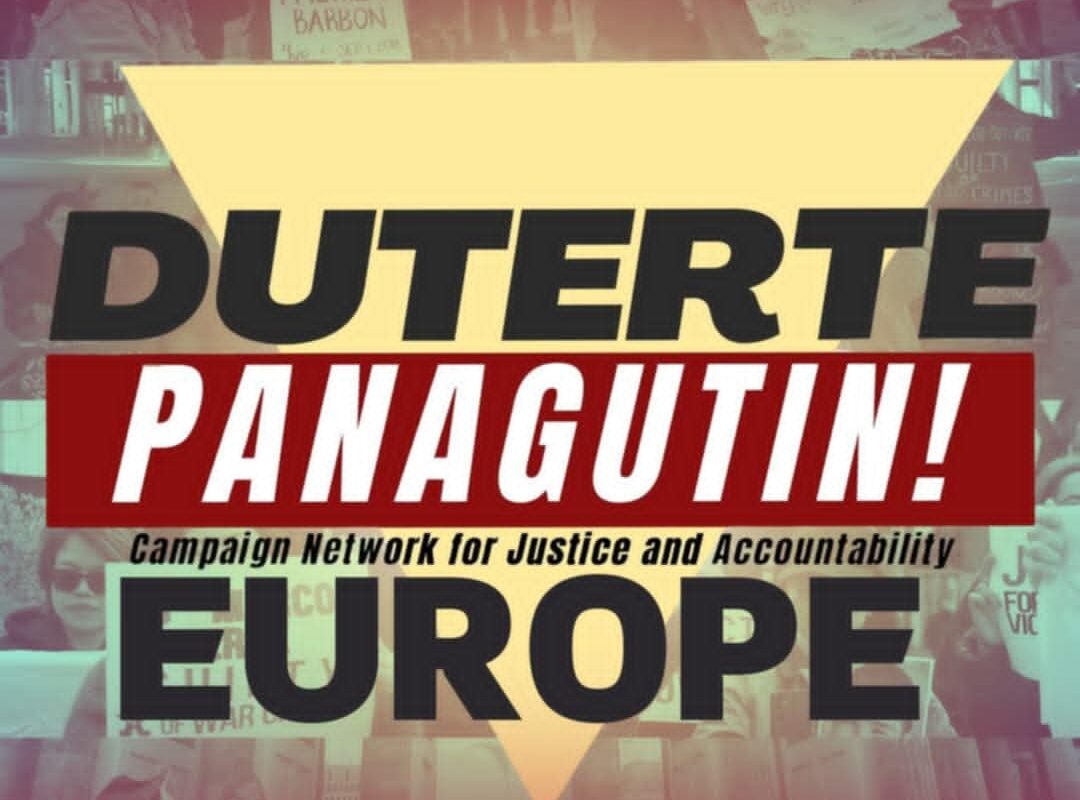On 28th April, Berlin police banned all demonstrations for Palestine until the 1st May. Police press spokesman Thilo Cablitz said “we have deployed emergency forces, particularly in North Neukölln and Kreuzberg [both districts with a large Muslim population] which will ensure that people do not come together. If necessary, people will be ordered to disperse.”
On the same day, police rerouted the Revolutionary 1st May Demo, which for years has been the largest demonstration on International Workers’ Day in Berlin. Neukölln mayor Martin Hikel (SPD) and the conservative evangelical Deutsch-Arabisches Zentrum had organised a series of last minute Iftar (fast-breaking) events which blocked the planned demo route.
Following the 1st May demonstrations, Palästina Spricht, an activist organisation of left wing Palestinians, was accused by the Jewish Forum for Democracy and Against Anti-Semitism of being anti-Jewish. The Forum objected to the slogan “Intifada is our class struggle”, which it claims equates Jewishness with capitalism.
You may or may not have heard about these incidents. If you have, it was almost certainly as separate news reports which implied that they have nothing to do with each other. And yet, taken together they show at least two worrying trends in Germany, and particularly in Berlin politics.
The original ban
The pretext for banning all Palestinian demonstrations was that if they took place, this could lead to antisemitic incidents. Berlin’s interior minister Iris Spanger (SPD) said “If the administrative authorities make a comprehensive overview and decide that in Berlin there are the preconditions for a ban according to freedom of assembly, I would greet and support it.”
This followed a previous demonstration, when a couple of kids shouted offensive slogans. This is a danger at all demonstrations which bring together people from different backgrounds and political beliefs. The main organisers of the demonstration were Palästina Spricht, whose spokesperson Nizar Haddad said in an interview with 99 zu Eins “I found these chants shit. They made me sick. Is it racist? Of course. But a single slogan by a young unorganised person does not make a demo of more than 2,000 people a racist or antisemitic procession, as was presented in all media”.
Palästina Spricht itself offered the following statement: “Our common consensus is international, intersectional and therefore consistently anti-racist. We have made this clear in our speeches and slogans. Of course it was clear to us in advance that this is a thorn in the side of the right-wing, racist media world. That’s why Springer & Co. [the owners of the main German tabloids] were on the look out for individuals among hundreds who they could show in order to drag the whole demo through the mud.”
Bans were not just threatened in Berlin. There was also a call to ban a demonstration in Frankfurt-Main on 30th April. SPD mayor Peter Feldmann justified the ban by saying that the demo had clearly gone past the borders allowed for legitimate protest, and that it would foment hatred and agitation.
I was on the Berlin demonstration. There was a significant Jewish contingent and a lot of anger about the incident that provoked the demo. But the subsequent press reports did not mention the Israeli forces who had brutally and repeatedly attacked Palestinians praying in the Al-Aqsa mosque during Ramadan. Once more, a protest against Israeli aggression ended up in a discussion which was entirely focussed on alleged Arab antisemitism.
The Revolutionary 1 May demonstrations
If you were to believe the official statements, the change of route for the 1 May demo was an accident. After all, no serious anti-racist could oppose an Iftar festival during Ramadan could they? And yet, as Aicha Jamal, speaker for the Revolutionary 1 May demo noted, the Iftar events were scheduled for 7pm, not 20.33 (sundown) when they should take place. Jamal argued that this showed an “actual ignorance of the Muslim communities on Sonnenallee”.
On the demonstration itself, police broke the demonstration into half on Karl-Marx Straße. The Rote Hilfe criticised the police behaviour, saying “the only reason that mass panic did not break out in this narrow space was the calm reaction of the demonstrators.” Later on, protestors were kettled by police, who attacked them with pepper spray.
Anyone looking for the real reason for the police attacks would do better by looking at the statement by the speaker of the police trade union. Benjamin Jendro justified the ban on Palestine demonstrations by saying “we already saw last year that pro-Palestinian organisations took part in the so-called revolutionary 1 May demo”.
The fact is that Berlin has recently experienced a new and welcome development. When Gaza was bombed in 2014, we struggled to mobilize 1,500 people. Last year, 15,000 took part in a lively demonstration through Berlin. For reasons that some of us are too aware of, the number of white Germans was small, but there was a significant number of non-Germans and Germans of colour who had been activated by the Black Lives Matter movement.
One of the more lasting effects of this has been a willingness by the organisers of the Revolutionary 1 May demo to take Palestinian rights seriously. This was by no means automatic – much of the German Left has traditionally taken an awful position on Palestine. But, partly because of the number of migrants involved in organising the revolutionary demo, significant progress has been made.
This means that the Revolutionary 1 May has become a crystallisation point for anti-racist activists who also want to overtake the German Left in their solidarity with Palestine. The attempt to neutralise this development has led to specific attacks on a demonstration that was once confined to a small section of the radical Left but has started to make political generalisations.
Accusations against Palästina Spricht
I already mentioned the Jewish Forum’s attack on Palästina Spricht. In an uncritical report by the Berliner Zeitung, the Forum also claimed that the banners “Apartheid exists, Palestine resists” is antisemitic. The reason? The banner had a subtitle: 27.027 km². This is the combined area of Israel, the West Bank and Gaza. This, the Forum claimed, “was aimed at a one-state solution, without the existence of Israel”.
If you want to check the bona fides of the Jewish Forum, you may also look at the Tweet that they made “proving” that the Revolutionary 1 May demo was full of “antisemitic events”. This tweet, was of a photo of placards saying things like “This Jewish voice is anti-Zionist” and “Apartheid states are not democracies”. The placards were produced by the entirely Jewish Jüdische Stimme (German chapter of the Jewish Voice for Peace).
In the topsy-turvy reporting to which we have become accustomed, calling for a state where everyone has equal rights, is somehow dangerous and undemocratic. Meanwhile demonstrations by Corona conspiracy theorists are allowed to continue unimpeded, despite the prevalence of actual antisemitic slogans, blaming “Rockerfeller, Rothschild & Co” and accepting the presence of organised Nazis.
The role of Franziska Giffey
The recent attacks on Palestine demos are part of a general trend which includes the secret dossier compiled on Anna-Esther Younes, the refusal of Amnesty International Germany to accept its mother organisation’s definition of Israel as an apartheid state, the Bundestag resolution outlawing BDS, the sacking of 7 Palestinian journalists at Deutsche Welle, the cancelling on German-Palestinian journalist Nemi El-Hassan, and many more incidents too numerous to list. So yes, this is at least in part about the peculiar refusal by large parts of German society to accept the possibility of Palestinian rights.
But it is also about something else. I would now like to spend a few words talking about Berlin’s new mayor Franziska Giffey. Giffey is currently best known for actively ignoring Berlin’s 60% vote to expropriate the big landlords. But she is not just an opponent of democracy. She also has a track record of authoritarianism and racism.
As Giffey was poised to become the SPD’s candidate for mayor, die Welt lauded her as “definitely a law and order politician.” It quoted Giffey as saying “the subjects of security and order are important to me – they are ur-social democratic subjects.” The election campaign with which she became mayor tried to focus less on stopping expropriation and more on law and order.
Before becoming Berlin mayor, Giffey was mayor of the racially mixed area of Neukölln. Her predecessor Heinz Buschkowsky (also SPD) was notorious for his racist policies, warning about parallel societies in which Arab magistrates supersede state justice. Giffey was the natural successor to Buschkowsky. She followed his tendency to parrot racist clichés in interviews by talking about criminal Arabs who were involved in drug dealing, prositution and money laundering. Her solution included a call for more video surveillance in working class areas.
In 2017, Giffey attacked clan criminality, one of the favourite code words used by German racists. She approved and encouraged raids on restaurants and arcades owned by non-white Germans. Regarding the 30,000 Neuköllners from Arab families, Giffey talked of those “who foul the whole reputation and do not abide by any rules and values.” Although she also spoke of “respectable Arabs”, she called for the confiscation of high-horsepower cars from criminals. The implication was that the criminals who would lose their cars would not be blond, blue-eyed Germans.
In the same year, when Eastern European migrants were forced to live in tents, Giffey issued a statement that “we can’t accept that new camps of tents appear with 30 or 40 people in a park. The answer can’t be ‘let the poor people have somewhere to sleep’”, adding “if you can’t afford it in Germany you must go back to Romania”.
Many of Giffey’s statements appear at first glance to be reasonable, but behind them an indifference to – or possibly hatred of – young migrants is never far behind the surface. This is the woman who is now in charge of Berlin’s policing. She is also already the focus of growing opposition – a video of a demonstrator throwing an egg at her on 1 May was widely shared on social media.
Conclusion
I don’t think that it is a coincidence that most people mentioned in this article as cracking down on the right to assembly are representatives of the SPD. Just as SPD Chancellor Olaf Scholz has increased Germany’s military budget without much visible opposition, social democrats are both eager to prove themselves willing partners of the establishment and able to convince their own constituency that a strong state is necessary.
This is the choice faced by social democrats who try to run the state. Some, like Giffey, eagerly take over all apparatuses of repression. Others are more circumspect, but still end up criminalising migrants and particularly Palestinians. Many good Leftists, who have tried to control the worst excesses of the police and army, have ended up endorsing more repression.
I do not know whether Giffey personally ordered the bans on demonstrations, or that the police feel empowered by her election after a campaign which focussed on law and order. In a sense it does not matter. Despite it’s liberal reputation, Berlin is becoming a city which denies the freedom of assembly to many of it’s non-white citizens.
What I do know is that every socialist, and hopefully everyone who reads this article, should be on the next demonstrations against police repression, against the attacks on free speech on Palestine, and against the horrors which are being inflicted on the Palestinian people on a daily basis. Thanks to the inspirational work of groups like Palästina Spricht, we finally have a serious movement against repression, racism and Israeli apartheid – even in Germany. This movement 100% deserves our full support.




